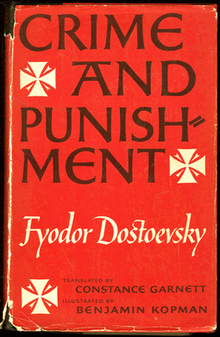
Crime and Punishment Page 2
We found 14 free papers on Crime and Punishment
Essay Examples
Overview
Book Report of the Novel ‘Crime and Punishment’
Book Report
Crime and Punishment
Novel
Punishment
The story of Crime and Punishment takes place in St. Petersburg, Russia’s capital, and centers around a murder. Unlike usual detective stories, the identity of the murderer is disclosed from the beginning. Nevertheless, instead of concentrating on the details of the offense, Dostoyevsky explores the killer’s mindset. Raskolnikov intends to murder an elderly woman and…
The Seven Principles of Law: A World View
Constitution
Crime and Punishment
The Us Constitution
The seven principles of law form the basis upon which authorities exercise their mandate in establishing if one is against the law. However, it is worth noting that the seven principles are not consistent all over the world since each nations law is shaped by her own traditions and values. It is imperative to understand…
Coverage of Problems in US and UK Detention Centers
Crime and Punishment
Immigration Issues
The United Kingdom and the United States have traditionally held similar stances on immigration, and in recent years, these stances have grown harsher. With the election of Donald Trump in the United States and Brexit in the United Kingdom, citizens who value nationalism and tightened security against refugees and immigrants have made themselves known as…
An Analysis of Descriptive Techniques in Crime and Punishment, a Novel by Fyodor Dostoyevsky
Crime and Punishment
Literature
In the novel Crime and Punishment, the Russian author Feodor Dostoevsky implements certain narrative techniques which aid greatly in accurately portraying the lives, surroundings, physical characteristics and hardships of protagonist Rodya Raskolnikov, as well as the rest of the lower class in St. Petersburg where the story is set. In addition to simply depicting the…
An Example of a Bureaucracy
Bureaucracy
Employment
Pharmacy
The bureaucracy I will discuss is the company for which I work. We are a large-scale pharmacy benefits manager. If you receive your medication through a home delivery program, there’s a good chance it’s through my employer. The company is headquartered in St. Louis, Missouri and has sites all over the country. My employer employs…
The principal characteristics of the weberian bureaucracy
Bureaucracy
Organization
Bureaucracy has been studied for a long clip now and many organisations have adopted this theoretical account in the twenty-four hours to twenty-four hours running of their organisation. The purpose of this essay is to research the ideal type bureaucratism developed by Max Weber, its features, the function of power and authorization on it and…
Max Weber’s Sociological Analysis of Bureaucracy
Bureaucracy
Sociology
Rationalization and its different manifestation occupied the most of Weberian thought and remained a focused point in his sociological thought. This focus on rationalization also forced him to contemplate on the processes and development of large-scale organizations in the public and private sectors. Weber presented his idea and application of rationalization on the large-scale organizations…
Concept of rationalization
Bureaucracy
Capitalism
Society
Rationalization Rationalization affects our humanity. Weber (1958) defined rationalization as the increasing role of calculation and control in social life. It is a trend leading to the iron cage of bureaucracy. According to him, we have locked ourselves in an iron cage of rationality. Rationalization is our modern horizon. Technological design is believed to…
The Rise of Bureaucratic Authoritarianism in Latin America: Argentina, Brazil and Chile
Bureaucracy
Latin America
The Rise of Bureaucratic Authoritarianism in Latin America: Argentina, Brazil and Chile Economic Crisis The populist policies with which the Latin American countries of Argentina, Chile and Brazil had been experimenting during the decades leading up to the 1960’s held apparent benefits for the robust working class population that they contained (O’Donnell). While the working…
Congress, Presidency, the Bureaucracy
Bill Clinton
Bureaucracy
Introduction The reigns of Presidents Bush and Clinton were characterized by differences and the patterns of approval ratings differed considerably. It should be acknowledged that these differences had various implications to the American economy and its general stability as well as foreign undertakings. This paper explores these differences while highlighting the key determinants that could…
| author | Fyodor Dostoevsky |
|---|---|
| genre | Philosophical novel; Psychological fiction; Crime fiction |
| originally published | 1866 |
| description | Crime and Punishment is a novel by the Russian author Fyodor Dostoevsky. It was first published in the literary journal The Russian Messenger in twelve monthly installments during 1866. It was later published in a single volume. |
| characters | Rodion Raskolnikov, Sonia Marmeladova, Arkady Ivanovich Svidrigailov |
| quotations | “Pain and suffering are always inevitable for a large intelligence and a deep heart.” “I did not bow down to you, I bowed down to all the suffering of humanity.” “We’re always thinking of eternity as an idea that cannot be understood, something immense. |
| information | Age: 23-year-old Language: Russian Message: Alienation from Society Alienation is the primary theme of Crime and Punishment. At first, Raskolnikov’s pride separates him from society. He sees himself as superior to all other people and so cannot relate to anyone. Within his personal philosophy, he sees other people as tools and uses them for his own ends., Set: Crime and Punishment is set in St. Petersburg, Russia. St. Petersburg is located on the middle western border of Russia between Finland and Estonia., |

